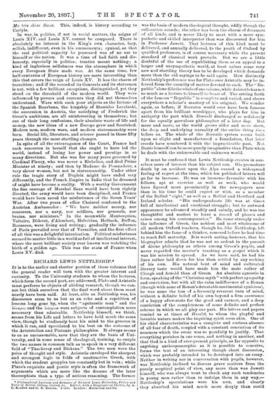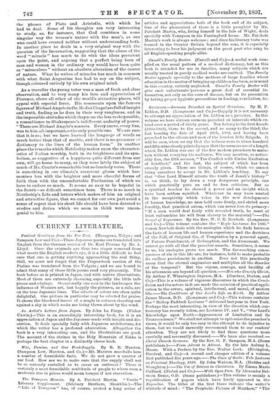RICHARD LEWIS NETTLESHIP.*
IT is to the earlier and shorter portion of these volumes that the general reader will turn with the greater interest and curiosity. To the University students to whom the lectures, which form the second part, are addressed, Plato and Aristotle must perforce be objects of abiding research, though we can- not but think ourselves that the final word about them must nearly have been said. At least, able as Nettleship was, his discourses seem to us but as an echo and a repetition of lessons long gone by, when the " apolaustic man " and the UYCC121; and the iris-I icc were subjects of contemplation more necessary than admirable. Nettleship himself, we think, seems from his Life and letters to have held much the same view, though he studiously bent his mind to the grooves in which it ran, and speculated to his best on the outcome of the Aristotelian and Platonic philosophies. It always seems to us as unreasonable, save that they are the basis of Uni- versity, and in some sense of theological, training, to couple the two names in common talk as to speak in a very different field of " Thackeray and Dickens." The two men were the poles of thought and style. Aristotle enveloped the sharpest and strongest logic in folds of unattractive Greek, with which the student grapples too constantly but in vain ; while Plato's exquisite and poetic style is often the framework of arguments which are more like the dreams of the later theosophists than a type of serious reasoning. The former • Philosophical Lectures and Remains of Richard Lewis Nettleship, Fellow and Tutor of Batliol College. Oxford, &c. Edited, with a Biographical tdcetch, by A. C. Bradley and 0. It. Benson. 2 vole. London Macmillan and Co. was the basis of modern theological thought, oddly though the collocation sounds ; the other has been the charm of dreamers of all kinds, and is never likely to meet with a more sym- pathetic and skilled interpreter than was discovered for him in Professor Jowett. That lectures of this kind must be delivered, and annually delivered, to the youth of Oxford by qualified professors, is of course necessary while the present standard of classical work prevails. But we are a little doubtful of the use of republishing them as an appeal to a larger and unsympathetic world, at least unless some very new and startling theory has to be developed which demands more than the old sayings to be said again. How distinctly Nettleship's preference was for Plato over Aristotle may be in- ferred from the quantity of matter devoted to each. The " Re- public"alone fills the whole of one volume, while Aristotle has not so much as a lecture to himself to boast of. The setting forth of the famous " Republic " is complete and varied, and shows everywhere a scholar's mastery of his original. We wonder again, as before, if Socrates would ever have been famous apart from his brilliant worshipper, who plays for him in antiquity the part which Boewell discharged so sedulously for the equally garrulous philosopher of a later day. But more and more, as the world grows older and more stern, the deep and underlying unreality of the entire thing rises before us. The whole of the Socratic system seems built upon so slight and manufactured a foundation, that later creeds have numbered it with the impracticable past. Not Dante himself can be more purely imaginative than Plato when he deals with the unknowable and unknown world.
It must be confessed that Lewis Nettleehip creates in our- selves more of interest than his subject can. His premature death by an accident upon the Alps caused a widespread feeling of regret at the time, which his published letters will go far to increase. He was an immense favourite with his fellows, apt at exercise as well as work, who would have figured more prominently in the newspapers now than in his time he could expect or wish, as a member of the Balliol " eight," as well as a Balliol and Hertford and Ireland scholar. "His undergraduate life was at tiniest fall of intellectual and emotional struggle ; but to outward appearance be advanced steadily and calmly, and he was too thoughtful and modest to leave a record of phases and crises among his contemporaries." He came strongly under the influence of Green, the noblest and most wholesome of all modern Oxford teachers, though he, like Nettleship, left behind him the fame of a thinker, removed before he had time to reach fall maturity. It is worth noting, however, that his. biographer admits that he was not so ardent in the pursuit of divine philosophy as others among Green's pupils, and never regarded the master's teaching as a gospel which it was his mission to spread. As we have said, he bad his lines rather laid down for him than settled by any seeking of his own. His natural bent of mind and cultivated literary taste would have made him the mate rather of Clough and Arnold than of Green. An absolute agnostic in• form, speaking of the " Christian myth" with perfect sympathy and conviction, but with all the calm indifference of a Renan (though with none of Renan's detestable sentimental cynicism), he was none the less of a fervently reverent turn of mind, without a definite belief of his own beyond a firm assurance of a happy after-state for the good and earnest, and a deep conviction of the completeness of some definite and perfect scheme in which we all play our part. His letters and papers remind us at times of Hamlet, to whom the playful and loveable nature makes the inquiring spirit seem akin. One of his chief characteristics was a complete and curious absence of all fear of death, coupled with a constant conviction of its nearness which the event was so painfully to justify. That everything perishes in one sense, and nothing in another, and that God is a kind of ever-present principle, as far opposite to anything anthropomorphic as it is possible to conceive, forms the text of an interesting though short discussion, which was probably intended to be developed into an essay. Neither in writing nor in conversation with pupils, however, was Nettleship inclined to discuss grave matters from the purely sceptical point of view, any more than was Jowett himself, who was always wont to check any such tendencies in young men rather than to indulge them in any way,— Nettleship's speculations were his own, and clearly they absorbed his mind much more deeply than could the phases of Plato and Aristotle, with which he had to deaL Some of his thoughts are very interesting to study, as, for instance, that God combines in some singular way the woman's nature with the man's, as one who could have created neither without understanding both. In another place he deals in a very original way with the question of the Incarnation, suggesting that the abuse of the word " miracle " has much to do with the ideas prevalent upon the point, and arguing that a perfect being born of man and woman in the ordinary way would have been quite as " miraculous " without an absolute alteration of the course of nature. What he writes of miracles has much in common with what Saint Augustine has had to say on the subject, though coloured entirely by his own original mind.
As a traveller the young tutor was a man of fresh and close observation, and to very many his love and appreciation of Florence, above all other of the world's attractive places, will appeal with especial force. His comments upon the famous figures of Michael Angelo in the Medici Chapel are fall of insight and truth, finding as he does in their very roughness, and in the impossible attitudes which they none the less make possible, a resemblance to Shakespeare's indifferent audacity of power. " These are Michael Angelo's sonnets. Every curve, every line, was to him all-important,—the only possible one. We are sure that it is so ; but we have learned the language of words so much better than that of marble, and there is no grammar or dictionary to the lines of the human form." In another place the remarks which Nettleship makes upon the character- istics of Italian worship, both in its brightness and its sym- bolism, as suggestive of a happiness quite different from our own, will go home to many, as they were lately the subject of much of Mr. Coutts's remarkable but melancholy verse. There is something in our climate's recurrent gloom which har- monises less with the brighter and more cheerful forms of faith than with the uncomfortable Puritanism of which we have to endure so much. It seems so easy to be hopeful in the South—so difficult sometimes here. There is so much in Nettleship's Life and letters which makes of him an original and attractive figure, that we cannot for our own part avoid a sense of regret that his short life should have been devoted to studies and duties which we seem to think were uncon- genial to him.























































 Previous page
Previous page